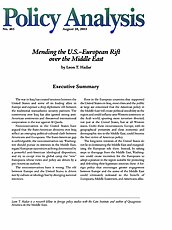Neoconservatives in the United States have argued that the Euro-American divisions over Iraq reflect an emerging political-cultural clash between Americans and Europeans. The Euro-American gap is unbridgeable, the neoconservatives say. Washington should pursue its interests in the Middle East, regard European opposition as being determined by a powerful anti-American ideological disposition, and try to co-opt into its global camp the “new” Europeans whose views and policy are driven by a pro-American outlook.
The neoconservatives have it wrong. The rift between Europe and the United States is driven not by culture or ideology but by diverging national interests.
Even in the European countries that supported the United States on Iraq, most elites and the public at large are concerned that the American policy in the Middle East will create political instability in the region and could inflame anti-Western sentiment in the Arab world, spurring more terrorism directed, not just at the United States, but at all Western states. Under these circumstances, Europe, with its geographical proximity and close economic and demographic ties to the Middle East, could become the first victim of American policy.
The long-term interests of the United States do not lie in dominating the Middle East and marginalizing the European role there. Instead, by taking steps to disengage from the Middle East, Washington could create incentives for the Europeans to adopt a posture in the region suitable for protecting and defending their legitimate interests there. A foreign policy that encourages greater engagement between Europe and the states of the Middle East could ultimately redound to the benefit of Europeans, Middle Easterners, and Americans alike.

